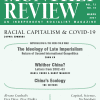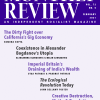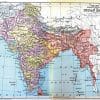
Socialist Practice and Transition
In Socialist Practice, a collection of essays on leftist theory and experiences, Victor Wallis adheres to the view that the achievement of socialism is a drawn out, nonlinear process consisting of episodes that in many cases have a mixed impact on the revolutionary cause. He analyzes several, ranging from the seven decades of Soviet rule to the New Left of the 1960s. His main thesis is that over the last century pure socialism has never existed and that on all fronts socialist movements and governments have contained elements of the old—namely, capitalism. | more…

Was Folk Music a Commie Plot?
The revival of folk music—music derived from rural southern sources, unamplified, and, to a large extent, comprised of old songs of anonymous origin—was more than just another fad. Folk music encapsulated longings for an idyllic past, for a time before crass commercialism turned music into a commodity, and for relationships between musicians and audiences that were egalitarian and holistic. | more…

March 2021 (Volume 72, Number 2)
Despite all of the inevitable contradictions, China stands out in the present planetary emergency in having advanced an ambitious vision of ecological civilization with the strong support of the Chinese population. Paraphrasing C. Wright Mills on Cuba, we do not worry about China’s struggle to create an ecological civilization. We worry with it. | more…

The Ideology of Late Imperialism
In 1990, when renowned Indian Marxian economist Prabhat Patnaik asked “Whatever Happened to Imperialism?,” once vibrant and influential schools of theories on imperialism were at a postwar historic low. When he left the West to return to India in 1974, imperialism was at the center of all Marxist discussions. But when he came back to the West merely fifteen years later, imperialism already seemed out of fashion. The retreat from the question of imperialism has marked a return of what we can call Second International politics. | more…
Racial Capitalism and COVID-19
The COVID-19 pandemic has brought into sharp relief the deep structural problems affecting nonwhite racialized workers in the core and periphery. Yet, many social scientific analyses of the global political economy, at least in the pre-COVID era, are race neutral or willfully indifferent to the persistent racial pattern of global inequalities. Even if they do address legacies of colonialism, they ignore the ongoing racial logics of oppression embedded therein. | more…

Capital, Science, Technology
Capitalist modernity not only contains profound contradictions, but is also undergoing a significant transformation. Far from acting as a driving force for the development of social productive forces, it has become a parasitic entity with an essentially rentier and speculative function. Underlying this is an institutional framework that favors the private appropriation and the concentration of the products of general intellect. | more…

A Commodius Vicus of Recirculation
“In the mid-1990s, when I lived in central London, I used to walk past the British Museum nearly every day. More often than not, I would pop in, did so for years, getting thrilled by a couple of things. The first was entering the great Reading Room, for which I had a Reader’s Card, glimpsing and even sitting in space G-7. I never ordered any books, had no need to order anything; all I wanted was to sit there, in Karl Marx’s seat, and try to feel the vibe. Usually, there was no vibe, only the hushed shuffling and page turning of others close by, mixed with the odd cough and splutter.” | more…

Whither China?
In December 2002, Isabel Crook, a Canadian anthropologist who had spent most of her life in China and a longtime friend and supporter of Monthly Review, wrote a letter to the MR editors questioning the critical nature of coverage of China’s capitalist road to socialism since the ascendance of Deng Xiaoping in the late 1970s. This short exchange with Harry Magdoff reflects the complex ways in which dedicated socialists sought to address changes in China and the clarity of the ideas expressed. | more…

What We Recovered in the Revolution
A prolific political writer, Álvaro Cunhal—leader of Portugal’s Communist Party for half a century and central figure of the 1974 Carnation Revolution—revealed in 1994 that he had also written several novels under the pseudonym Manuel Tiago. One of these novels, Five Days, Five Nights, was only translated into and published in English in 2020. The novella manages to capture the complexities, loneliness, and bravery of ordinary people, highlighting how we are the ones who keep us safe. | more…

February 2021 (Volume 72, Number 8)
We remember our good friend and comrade, Leo Panitch, one of the great socialist intellectuals of all time, who died on December 19, 2020, age 75. | more…

The Drain of Wealth
The Western European powers appropriated economic surplus from their colonies, materially and substantially aiding their own industrial transition from the eighteenth century onward, as well as the diffusion of capitalism to the regions of new European settlement. In the case of India, the concept of drain is based on the fact that a substantial part of its earnings was never permitted to accrue to the country; it was instead appropriated by the ruling power: Britain. | more…

The Ecological State
Although natural constraints on supply are important, most economic scarcities that rule our lives are actually social and artificial. Supply and demand are not natural forces drifting through the air; they are contrived realities established by an interactive social environment involving governments, corporations, institutions, and classes. Supply and demand cycles are social constructs designed to answer a basic question: Who gets what? | more…

Manipulations of Freedom
On California’s November 2020 ballot were some contentious and important issues, including Proposition 22, classifying rideshare drivers and app-based delivery workers as independent contractors. Gig economy giants Uber, Lyft, Doordash, and others spent a whopping $111 million on Prop 22. Of course, the companies had a lot to lose. If they were made to treat their drivers or delivery people as employees and compensate them accordingly, they would be bankrupted, they claimed. | more…